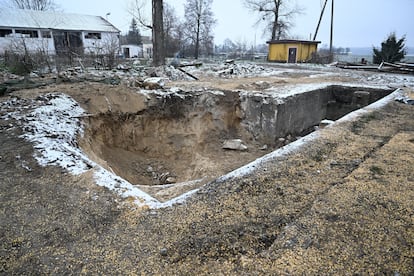Missile incident in Poland heightens concerns about poor protection of Europe’s eastern skies
Countries on NATO’s eastern flank are accelerating efforts to secure anti-aircraft systems to guard against similar future events due to the war in Ukraine

The world held its breath for a few hours last week when a missile crashed into a Polish town four miles from the Ukrainian border. For a moment there were fears that the explosion, which killed two people, was a Russian attack on a European Union country and a NATO member. Fears that the conflict in Ukraine would spill over into global warfare faded shortly after it was announced that it was probably a missile from the Ukrainian air defense system that had landed in Poland by mistake, on its way to intercepting a Russian projectile.
But the incident has had an immediate effect on the defensive plans of the countries in the area; it has activated and expedited the region’s intention to rearm, and highlighted the feeling of insecurity regarding the protection of their skies.
Berlin has taken the initiative: it has offered Poland air defense systems that it has in reserve, the American Patriots, in addition to sky patrols with its Eurofighter planes. Warsaw initially accepted, and both countries analyzed where to place two units of the US-made long-range surface-to-air missile system. The Polish Defense Minister, Mariusz Blaszczak, welcomed the German proposal on Monday with “great satisfaction” and announced that the systems would likely be deployed “near the border.”
However, late on Wednesday, after learning about the Russian bombing of Ukrainian infrastructure that left a dozen dead and power cuts in Kyiv and other cities, Blaszczak said that he has asked Germany to transfer the Patriots to Ukraine’s western border instead. “This will protect Ukraine from further victims and blackouts and increase security on our eastern border,” he said in a Twitter message. The proposal would require approval from Germany and the United States, maker of the Patriots.
Warning for years

The countries on NATO’s eastern flank, geographically the closest to Russia – and which have been warning for years about the risks posed by the Kremlin’s bellicose, imperialistic and expansionist policies – are on alert. The Baltic states and Poland already dedicate a significant percentage of their gross domestic product (GDP) to defense material; Estonia, for example, spends more than 3%. Some forums are now talking about raising that figure a little higher.
“The missile incident has accelerated states’ efforts to provide themselves with better protection. Concern has grown that an accident like this could happen again,” says Rafael Loss, a defense analyst at the European Council on Foreign Relations (ECFR). Anti-aircraft systems can increase the sense of security of being able to deal with either another stray missile or a deliberate attack and reduce the risk of escalation, adds Loss.
The explosion in Poland, the first direct and deadly effect of Russia’s war in Ukraine on EU and NATO territory, has set off alarm bells in Lithuania, a member of the Atlantic Alliance since 2004. This Baltic nation wants to reinforce its air defenses as soon as possible. The country’s national security council on Monday agreed to speed up the purchase of medium-range anti-aircraft missiles, according to an adviser to President Gitanas Nauseda. This spokesman said that the design of a new air defense system for the region is “a priority” in the preparations for the 2023 NATO summit, which will be held in Vilnius, the capital of Lithuania.
European Sky Shield
In central and eastern Europe, air safety has been a constant concern ever since the start of the Russian invasion of Ukraine. The best example, recalls Julian Pawlak, a researcher at the German Institute for Defense and Strategic Studies (GIDS), is the German project to design a European Sky Shield, which 15 states have already joined. The initiative aims to integrate the anti-aircraft defense systems of the surrounding countries, in coordination with NATO, to deal with the Russian threat.
Poland is not participating for the moment, although its announced collaboration with Germany could make it change its mind, says Pawlak. This expert draws parallels between the missile that fell on Polish territory and the sabotage of the Nord Stream gas pipelines last September. “In both cases it was widely known that there was a vulnerability, but an accident had to occur on EU territory for the issue to be placed at the top of the public agenda,” he says.
But the renewed interest of countries located near Ukraine to improve their own air defense capabilities is coming up against the “very limited” availability of these systems, says Loss. Many of those that were available have been ceded to Ukraine to defend critical infrastructure and population centers from Russian air strikes. Slovakia, for example, has donated Russian-made S-300 anti-aircraft missile systems to Kyiv, and now finds itself with “a certain gap.” The situation is similar in other countries and with other types of weapons. Many have depleted arsenals after delivering defense material to Ukraine.
Last week, the heads of arms purchases of the Atlantic Alliance members met in Brussels to discuss coordinated acquisitions, and the foreign ministers of NATO members will meet in Bucharest next week to discuss the strategic union and the replenishment of arsenals in a complex scenario that involves not so much regular purchases as long-term strategic ones. Despite being part of the Alliance, several countries do not want to share or coordinate with their partners, said sources from the organization. And the same goes for the joint purchasing policy launched by the European Union at the beginning of last summer, which has yet to take off, said EU sources.
The sophisticated IRIS-T defense system that Germany delivered to Ukraine a few weeks ago, for example, came straight from the factory. It had not previously been used by the German Army. In fact, it was part of an order placed by Egypt, which authorized giving preference to the country under attack. “Germany has reached its maximum capacity in what it can deploy in a non-war situation. You have to maintain a certain reserve. It’s not just about the equipment, but about the people who maintain and operate it,” says Loss. The manufacturers of war material work based on the orders they receive. The next three IRIS-T anti-aircraft systems that Germany has promised to Ukraine are still being manufactured.
The proliferation of weapons so close to Ukraine raises other concerns as well. “The more missile systems there are in the immediate vicinity of a war, the higher the chances of malfunctions and escalation,” notes the ECFR expert. But the risk is still low overall, he adds, because military commanders from the United States and Russia maintain contact precisely as a guarantee that in the event of an error, the tension can be reduced.
Sign up for our weekly newsletter to get more English-language news coverage from EL PAÍS USA Edition
Tu suscripción se está usando en otro dispositivo
¿Quieres añadir otro usuario a tu suscripción?
Si continúas leyendo en este dispositivo, no se podrá leer en el otro.
FlechaTu suscripción se está usando en otro dispositivo y solo puedes acceder a EL PAÍS desde un dispositivo a la vez.
Si quieres compartir tu cuenta, cambia tu suscripción a la modalidad Premium, así podrás añadir otro usuario. Cada uno accederá con su propia cuenta de email, lo que os permitirá personalizar vuestra experiencia en EL PAÍS.
¿Tienes una suscripción de empresa? Accede aquí para contratar más cuentas.
En el caso de no saber quién está usando tu cuenta, te recomendamos cambiar tu contraseña aquí.
Si decides continuar compartiendo tu cuenta, este mensaje se mostrará en tu dispositivo y en el de la otra persona que está usando tu cuenta de forma indefinida, afectando a tu experiencia de lectura. Puedes consultar aquí los términos y condiciones de la suscripción digital.








































